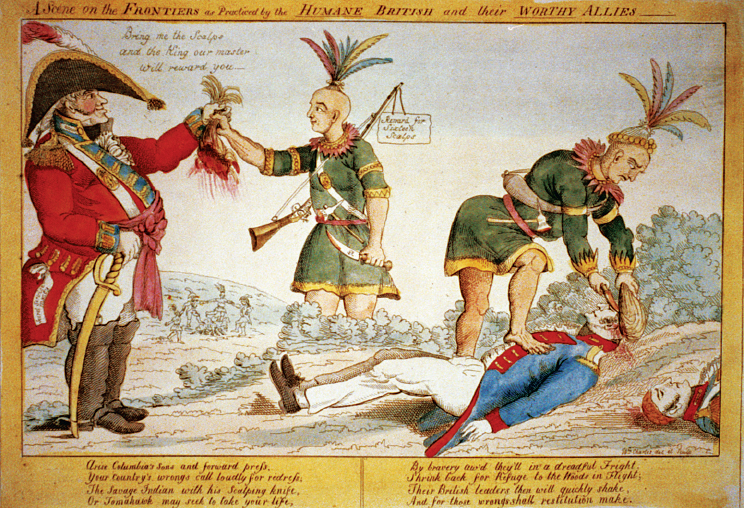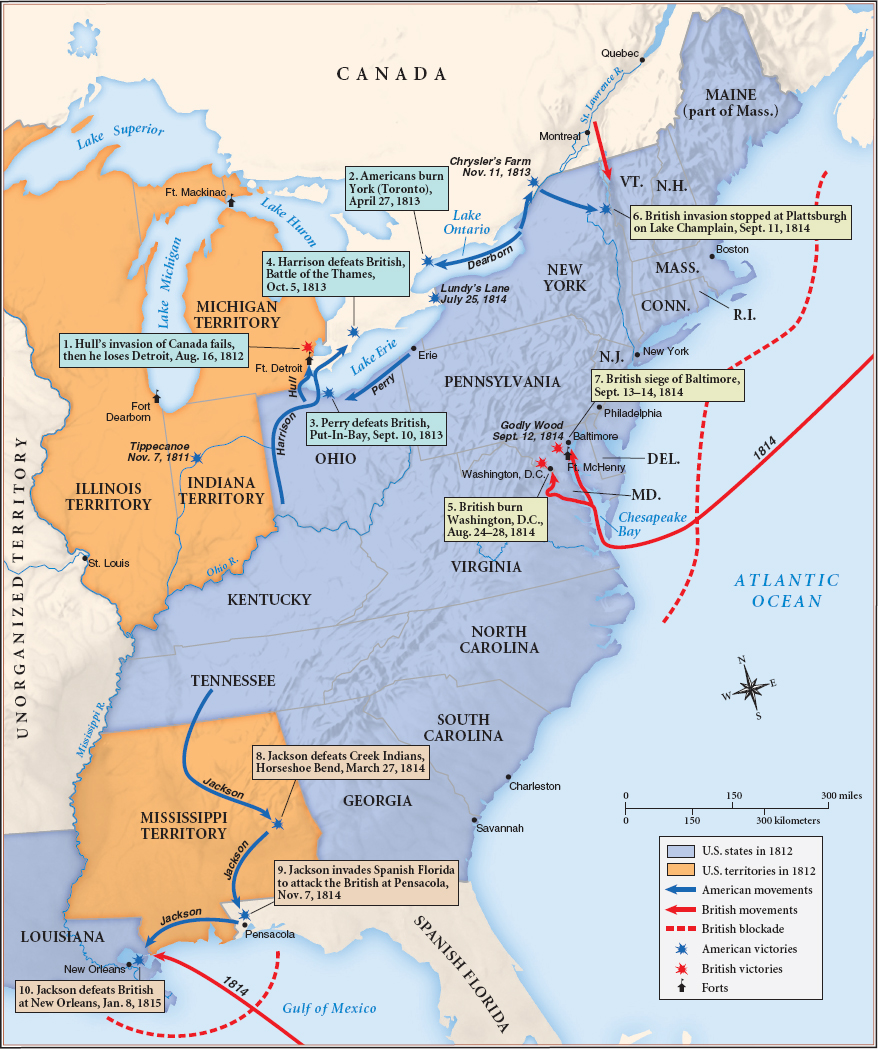America’s History: Printed Page 236
America: A Concise History: Printed Page 215
America’s History: Value Edition: Printed Page 209
The War of 1812
The War of 1812 was a near disaster for the United States. An invasion of British Canada in 1812 quickly ended in a retreat to Detroit. Nonetheless, the United States stayed on the offensive in the West. In 1813, American raiders burned the Canadian capital of York (present-day Toronto), Commodore Oliver Hazard Perry defeated a small British flotilla on Lake Erie, and General William Henry Harrison overcame a British and Indian force at the Battle of the Thames, taking the life of Tecumseh, now a British general.

In the East, political divisions prevented a wider war. New England Federalists opposed the war and prohibited their states’ militias from attacking Canada. Boston merchants and banks refused to lend money to the federal government, making the war difficult to finance. In Congress, Daniel Webster, a dynamic young politician from New Hampshire, led Federalists opposed to higher tariffs and national conscription of state militiamen.

Gradually, the tide of battle turned in Britain’s favor. When the war began, American privateers had captured scores of British merchant vessels, but by 1813 British warships were disrupting American commerce and threatening seaports along the Atlantic coast. In 1814, a British fleet sailed up the Chesapeake Bay, and troops stormed ashore to attack Washington City. Retaliating for the destruction of York, the invaders burned the U.S. Capitol and government buildings. After two years of fighting, the United States was stalemated along the Canadian frontier and on the defensive in the Atlantic, and its new capital city lay in ruins. The only U.S. victories came in the Southwest. There, a rugged slave-owning planter named Andrew Jackson and a force of Tennessee militiamen defeated British- and Spanish-supported Creek Indians in the Battle of Horseshoe Bend (1814) and forced the Indians to cede 23 million acres of land (Map 7.5).
Federalists Oppose the War American military setbacks increased opposition to the war in New England. In 1814, Massachusetts Federalists called for a convention “to lay the foundation for a radical reform in the National Compact.” When New England Federalists met in Hartford, Connecticut, some delegates proposed secession, but most wanted to revise the Constitution. To end Virginia’s domination of the presidency, the Hartford Convention proposed a constitutional amendment limiting the office to a single four-year term and rotating it among citizens from different states. The convention also suggested amendments restricting commercial embargoes to sixty days and requiring a two-thirds majority in Congress to declare war, prohibit trade, or admit a new state to the Union.
As a minority party, the Federalists could prevail only if the war continued to go badly — a very real prospect. The war had cost $88 million, raising the national debt to $127 million. And now, as Albert Gallatin warned Henry Clay in May 1814, Britain’s triumph over Napoleon in Europe meant that a “well organized and large army is [now ready] … to act immediately against us.” When an attack from Canada came in the late summer of 1814, only an American naval victory on Lake Champlain stopped the British from marching down the Hudson River Valley. A few months later, thousands of seasoned British troops landed outside New Orleans, threatening American control of the Mississippi River. With the nation politically divided and under attack from north and south, Gallatin feared that “the war might prove vitally fatal to the United States.”
Peace Overtures and a Final Victory Fortunately for the young American republic, by 1815 Britain wanted peace. The twenty-year war with France had sapped its wealth and energy, so it began negotiations with the United States in Ghent, Belgium. At first, the American commissioners — John Quincy Adams, Gallatin, and Clay — demanded territory in Canada and Florida, while British diplomats sought an Indian buffer state between the United States and Canada. Both sides quickly realized that these objectives were not worth the cost of prolonged warfare. The Treaty of Ghent, signed on Christmas Eve 1814, retained the prewar borders of the United States.
That result hardly justified three years of war, but before news of the treaty reached the United States, a final military victory lifted Americans’ morale. On January 8, 1815, General Jackson’s troops crushed the British forces attacking New Orleans. Fighting from carefully constructed breastworks, the Americans rained “grapeshot and cannister bombs” on the massed British formations. The British lost 700 men, and 2,000 more were wounded or taken prisoner; just 13 Americans died, and only 58 suffered wounds. A newspaper headline proclaimed: “Almost Incredible Victory!! Glorious News.” The victory made Jackson a national hero, redeemed the nation’s battered pride, and undercut the Hartford Convention’s demands for constitutional revision.
IDENTIFY CAUSES
Question
What do you think is the most persuasive explanation for the United States’s decision to declare war on Great Britain in 1812?